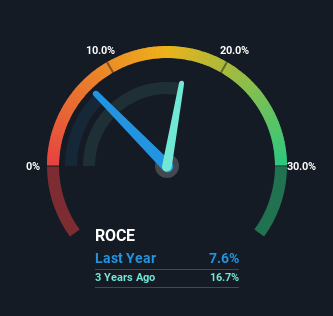Stock Analysis
- South Korea
- /
- Electronic Equipment and Components
- /
- KOSDAQ:A204270
Returns On Capital Signal Tricky Times Ahead For JNTC (KOSDAQ:204270)

Finding a business that has the potential to grow substantially is not easy, but it is possible if we look at a few key financial metrics. Typically, we'll want to notice a trend of growing return on capital employed (ROCE) and alongside that, an expanding base of capital employed. This shows us that it's a compounding machine, able to continually reinvest its earnings back into the business and generate higher returns. In light of that, when we looked at JNTC (KOSDAQ:204270) and its ROCE trend, we weren't exactly thrilled.
Understanding Return On Capital Employed (ROCE)
For those who don't know, ROCE is a measure of a company's yearly pre-tax profit (its return), relative to the capital employed in the business. To calculate this metric for JNTC, this is the formula:
Return on Capital Employed = Earnings Before Interest and Tax (EBIT) ÷ (Total Assets - Current Liabilities)
0.076 = ₩29b ÷ (₩654b - ₩278b) (Based on the trailing twelve months to December 2023).
Thus, JNTC has an ROCE of 7.6%. On its own that's a low return, but compared to the average of 6.0% generated by the Electronic industry, it's much better.
Check out our latest analysis for JNTC

In the above chart we have measured JNTC's prior ROCE against its prior performance, but the future is arguably more important. If you'd like, you can check out the forecasts from the analysts covering JNTC for free.
So How Is JNTC's ROCE Trending?
In terms of JNTC's historical ROCE movements, the trend isn't fantastic. To be more specific, ROCE has fallen from 27% over the last five years. However, given capital employed and revenue have both increased it appears that the business is currently pursuing growth, at the consequence of short term returns. And if the increased capital generates additional returns, the business, and thus shareholders, will benefit in the long run.
On a side note, JNTC's current liabilities have increased over the last five years to 43% of total assets, effectively distorting the ROCE to some degree. Without this increase, it's likely that ROCE would be even lower than 7.6%. And with current liabilities at these levels, suppliers or short-term creditors are effectively funding a large part of the business, which can introduce some risks.
In Conclusion...
While returns have fallen for JNTC in recent times, we're encouraged to see that sales are growing and that the business is reinvesting in its operations. Furthermore the stock has climbed 90% over the last three years, it would appear that investors are upbeat about the future. So should these growth trends continue, we'd be optimistic on the stock going forward.
If you want to continue researching JNTC, you might be interested to know about the 2 warning signs that our analysis has discovered.
While JNTC may not currently earn the highest returns, we've compiled a list of companies that currently earn more than 25% return on equity. Check out this free list here.
Valuation is complex, but we're helping make it simple.
Find out whether JNTC is potentially over or undervalued by checking out our comprehensive analysis, which includes fair value estimates, risks and warnings, dividends, insider transactions and financial health.
View the Free AnalysisHave feedback on this article? Concerned about the content? Get in touch with us directly. Alternatively, email editorial-team (at) simplywallst.com.
This article by Simply Wall St is general in nature. We provide commentary based on historical data and analyst forecasts only using an unbiased methodology and our articles are not intended to be financial advice. It does not constitute a recommendation to buy or sell any stock, and does not take account of your objectives, or your financial situation. We aim to bring you long-term focused analysis driven by fundamental data. Note that our analysis may not factor in the latest price-sensitive company announcements or qualitative material. Simply Wall St has no position in any stocks mentioned.

Simply Wall St
About KOSDAQ:A204270
JNTC
JNTC Co., Ltd. provides connector, hinge, and tempered glass products in South Korea.
High growth potential and slightly overvalued.
